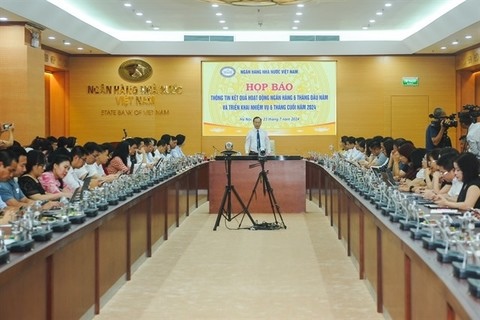|
Central bank works to ensure macroeconomic stability, inflation control
The State Bank of Vietnam (SBV) will manage interest rates in accordance with macroeconomic balance and inflation in the second half of 2024 to ensure macroeconomic stability and inflation control, an SBV official said on Tuesday.

The central bank said credit growth rate and credit structure will be managed appropriately to meet the capital needs of the economy, contributing to controlling inflation and supporting economic growth. — Photo courtesy of SBV
|
At a meeting to review H1 2024 results and implement second half of the year works of the banking industry held in Hà Nội, SBV deputy governor Đào Minh Tú said the SBV will continue to direct credit institutions to reduce operation costs to cut lending interest rates.
Tú said credit growth rate and credit structure will be managed appropriately to meet the capital needs of the economy, contributing to controlling inflation and supporting economic growth. By June 28 this year, credit increased by 6 per cent compared to the end of 2023, with focus on economic growth drivers.
“The central bank will continue to review and improve the legal framework to create favourable conditions for commercial banks and people in providing and having access bank credit,” Tú said, adding specific credit programmes and policies will be also promoted to remove difficulties for businesses and people.
Tú said the SBV is submitting to the Government a proposal to lower lending interest rate for home buyers, who borrow from the VNĐ120 trillion social housing credit package.
The rate will be 3 per cent lower than the rate for normal loans, compared to 2 per cent currently. The SBV also proposes that the loan interest rate adjustment period will be every three months, instead of every six months as currently. The preferential loan term will be extended from three years to five years and may be extended for the next five years depending on economic conditions at that time.
“The new proposals aim to create favourable conditions for people, who want to buy social houses, to access bank loans. It will help avoid the situation that lending interest rate might push up when the preferential period expires, causing difficulties for the home buyers,” Tú said, adding besides four State-owned commercial banks participating in the credit package, four other joint stock commercial banks also want to join in the package with a total capital of VNĐ20 trillion.
"The SBV encourages commercial banks and large economic corporations with financial strength to participate in supporting social housing development, in harmony with the Government’s current policies," Tú said.
However, Tú noted, the SBV will continue to strictly control credit for potentially risky areas.
As for the exchange rate, Tú said the rate will be managed flexibly with an aim to stabilise the foreign exchange market, contributing to macroeconomic stability and inflation control.
In the second half of this year, to ensure the banking system develop healthily, efficiently and transparently according to the provisions of Vietnamese laws and international standards, the central bank will drastically deploy a project on restructuring the banking system associated with handling bad debts.
“We will promote commercial banks to handle bad debts, improve credit quality, and prevent and minimise newly arising bad debts,” Tú said.
The banking industry will also continue to implement a digital transformation plan to 2025, with a vision to 2030, and a project to develop non-cash payments in Việt Nam for the 2021-25 period.
Bizhub
|